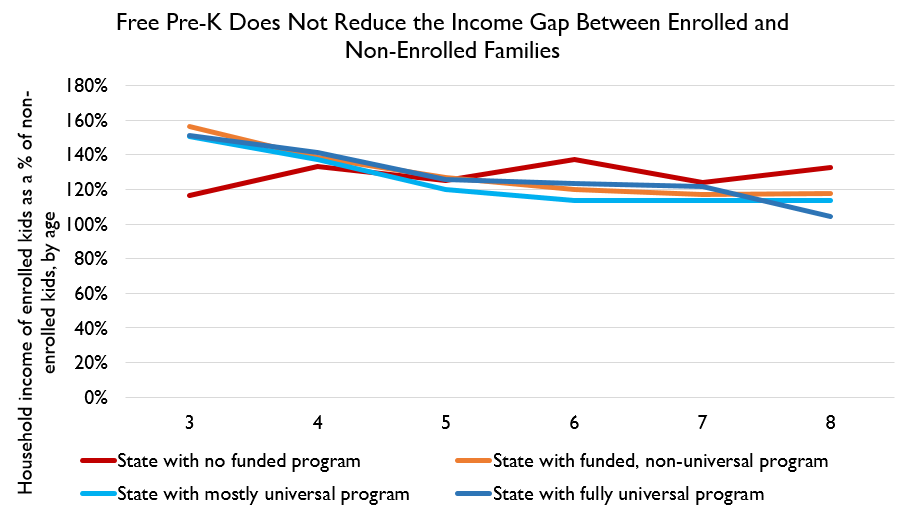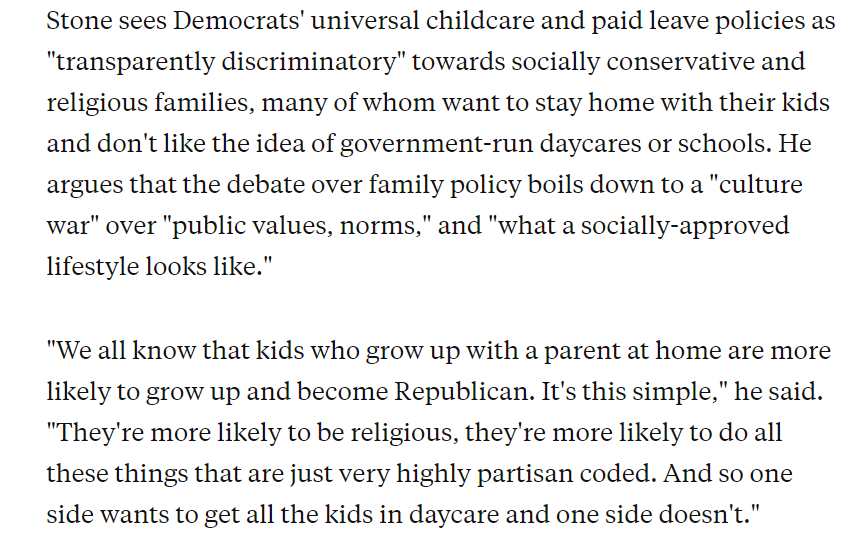
So, as an aside, if you read my whole comment, which I'm happy to see @eliza_relman used, this tweet I'm QTing is like a prima facie example of The Problem.
https://twitter.com/luscombeland/status/1384324170926936066
The article is here, and btw the article is full of a lot of extremely non-neutral language (it's marked as politics news, but it's clearly an editorial), but nonetheless Relman did manage to quote precisely one conservative (me): businessinsider.com/republican-bab…
So it's clear what my argument is: disputes about childcare are not informed by some neutralist account of the good, but instead are pretty much straightforwardly a debate about cultural transmission.
As an empirical matter, I'm obviously correct. This is absolutely what these political battles are about. Democrats believe it is fundamentally right and good to boost parental (and especially maternal) LFP, and believe childcare does that.
Republicans believe it is fundamentally right and good for children to have high degrees of parental (and because of the unfortunate realities of the wage gap this often means maternal) at-home input, and believe childcare wrecks that.
Both sides are aware of both "real" and "political" budget constraints. Passing childcare means not passing something else. The most likely something else is a bigger.
Furthermore, we actually have good empirical studies of what happens during childcare expansions: enrollment rises in population groups for whom benefits are SMALL, i.e. high-income households. Enrollment rises much less/not at all for poor people. journals.uchicago.edu/doi/10.1086/69…
The reason for this is that poor people are not *only* poor. They are also astronomically more likely to be ethnically, religiously, or linguistically different from the cultural majority.
Poor people tend to *correctly perceive* that public childcare (especially for kids at "pre-curricular" ages) will alter who their children become, often in ways they do not like.
I live in Quebec. Here it's extremely obvious that one of the goals of the free childcare program is making kids into Quebecois. Get'em young.
Remember folks: families who educate their kids at home tend to be *poorer* than families who use center-based care. This is true at preschool ages... but it’s true of homeschool parents too! ifstudies.org/blog/why-a-chi…
Now, there are some intellectually serious advocates of childcare like @ehaspel who argue that *high quality* childcare is an important form of *human capital investment*. I disagree, but I recognize the seriousness of this view!
But Biden’s plan does nothing to enhance quality.
But Biden’s plan does nothing to enhance quality.
The bones of the plan as they’ve been announced appear to provide huge supply and demand subsidies, but essentially no quality-focused reforms. So what we can expect is a big expansion in *moderate to low quality* childcare.
So while *in theory* you can make a kind of Heckman-style argument for childcare, the actual proposals on offer do not reflect human capital concerns, but simply reflect an objective of maximizing enrollment.
Which means we should not be discussing these proposals as investments in kids. They’re basically about subsidizing a certain style of parenting.
That’s why I called them transparently discriminatory. They’re about helping some parents and not others.
That’s why I called them transparently discriminatory. They’re about helping some parents and not others.
Now MAYBE YOU THINK that if we just fund childcare ENOUGH that poor people will use it.
No, wrong. Here's the household income ratio, program-enrolled vs. non-enrolled kids, by whether their state has universal pre-K or not.
No, wrong. Here's the household income ratio, program-enrolled vs. non-enrolled kids, by whether their state has universal pre-K or not.

Folks, states with totally-universal pre-K programs have the *identical* gap in household income between kids who are enrolled and kids who are not enrolled as states with partially-funded programs.
And the states with NO PROGRAM AT ALL have the SMALLEST gap!
And the states with NO PROGRAM AT ALL have the SMALLEST gap!
But that's a bias, because, spoiler, very few states have no program and they're all small with teeny sample sizes in ACS so that estimate is crap and you should ignore it.
But certainly going from "kinda funded" to "fully funded" has no association with equality.
But certainly going from "kinda funded" to "fully funded" has no association with equality.
The reason this gap exists is that there are *cultural roots* to childrearing norms! Certainly economic factors matter. And indeed, ENROLLMENT RATES do in fact rise as pre-K gets more subsidized. 

btw, source for which states have what kind of program is here: ecs.org/wp-content/upl…
Some folks asking for proof that childhood environment impacts partisanship.
I'll start with "excellent methods, limited results" and work my way down to "big associational stuff."
I'll start with "excellent methods, limited results" and work my way down to "big associational stuff."
So, do we know ANYTHING about the CAUSAL impact of household structure on adult partisanship?
Yes! Because sibling sex is pseudo-random, we can assess whether men having a sister impacts their political ideology! journals.uchicago.edu/doi/abs/10.101…
Yes! Because sibling sex is pseudo-random, we can assess whether men having a sister impacts their political ideology! journals.uchicago.edu/doi/abs/10.101…
Now, look, "Do you have any sisters" is a super small family structure thing. Like, I don't think anybody believes that "having a sister" is as influential on kids as "spending 25 extra hours per week with a parent."
We also know that *as adults* getting married and having children tends to make people (in this case women, but other studies show men too) adopt more socially conservative attitudes: nber.org/papers/w24740
Across 3 generations studied, parental attributes (including marital status) and enrollment environment predict the odds of correspondence between parental and child beliefs. journals.uchicago.edu/doi/abs/10.101…
I have shown in three different panel data sources that parental time investments in religious activities alter the odds that children remain affiliated as an adult. christianitytoday.com/ct/2020/februa…
Households with two working parents often CAN make these investments..... but it is harder! Time is limited!
This paper finds that attitudes towards risk and trust are highly transmissible, and odds of successful transmission can be separated from more-clearly genetic factors like height-transmission, and are linked to family structure: academic.oup.com/restud/article…
Broadly, big married families where the parents agree on their values have more successful transmission of trust and risk attitudes.
Now, you'll notice none of these actually study *childcare* or stay-at-home parents. The reason is that the methodological quality of such studies is lower. But the above studies show that parenting environment has been strongly and causally linked to values and attitudes....
In numerous contexts where we have the right kinds of variation to make such links.
The problem is, we often don't have good quasi-experimental variation (or we do but nobody has published based on it).
The problem is, we often don't have good quasi-experimental variation (or we do but nobody has published based on it).
But that doesn't mean we don't know *anything*! This paper finds that while institutional care arrangements have a small effect on child social skills, at-home parent activities have a monumentally larger effect: papers.ssrn.com/sol3/papers.cf…
Now many people will note that's not a fair tradeoff: it's not like if your kid is home for 6 hours that you'll spend 6 hours doing intensive parenting.
To which I say, true!
But it is empirically the case that, controlling for the at-home parent's SES, kids in institutional care do get fewer hours of playing together with their parents.
But it is empirically the case that, controlling for the at-home parent's SES, kids in institutional care do get fewer hours of playing together with their parents.
• • •
Missing some Tweet in this thread? You can try to
force a refresh





